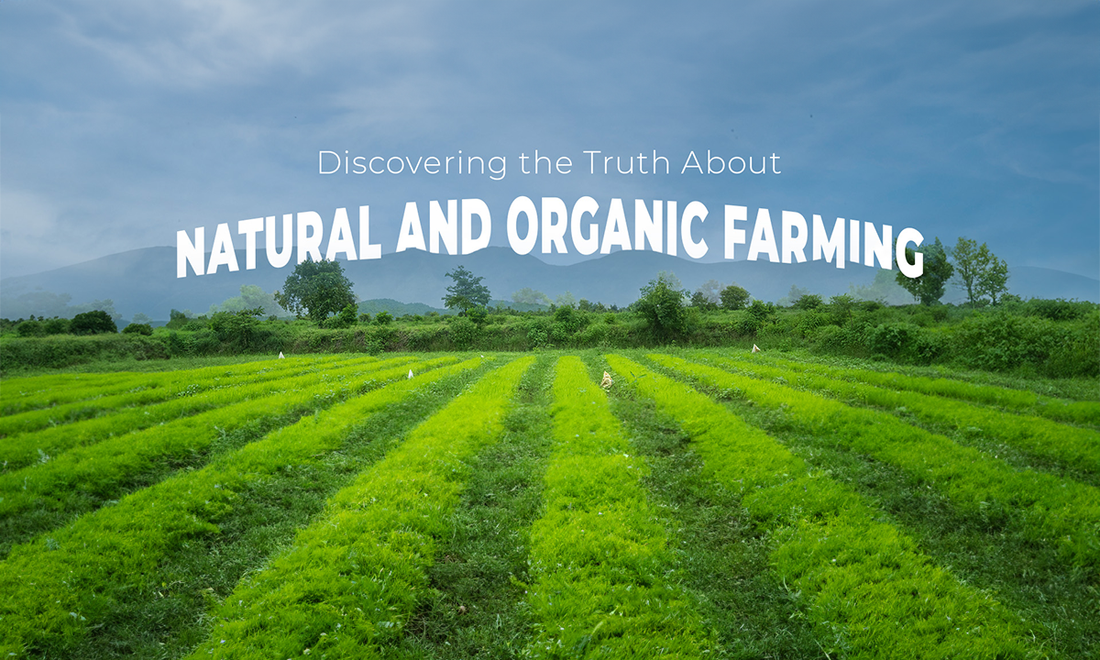Explore the Difference Between Natural and Organic Farming
Info Organic 5 min read
Agriculture has tremendously affected every aspect of human life since time immemorial. More than agriculture, it is the methods of agriculture that directly affect both the ecosystem and human health. With the ill effects caused by harmful practices, the world is continuously shifting towards more sustainable agricultural practices.
Two such sustainable and healthier farming practices are natural farming and organic farming. Though both may sound like synonyms to a layman, the practices have certain core differences that make them strikingly different.
In this blog, we will go through these core concepts of farming practices and the differences that make them unique. Let’s get started with understanding natural farming vs organic farming.

Understanding Natural and Organic Farming
Natural farming is an agricultural method that respects nature's inherent processes and encourages soil fertility and biodiversity through composting, cover cropping, and crop rotation.
Organic farming uses natural methods to maintain soil health and manage pests, reducing the use of synthetic chemicals and GMOs (genetically modified organisms). It requires organic certification and promotes sustainability and environmental responsibility.
Recommended Article: Harmful Effects Of Artificial Food Colouring
Similarities Between Natural Farming and Organic Farming
Both natural farming and organic farming emphasise natural resources and practices, frequently overlapping in agricultural strategies that support their shared objectives. Here are some important similarities between both methods:
- No Synthetic Chemicals: Natural and organic farming techniques completely avoid using synthetic chemicals for soil fertility, insect control, and plant development.
- Soil Health Enhancement: Both strategies prioritise healthy soil and techniques, like crop rotation, vermi compose, and cow dung manure, that improve the soil's structure and nutrient content while fostering plant resistance and higher yields.
- Biodiversity Promotion: Natural farming and organic farming encourage the development of various plant species, guard against diseases and pests, and enhance ecosystem health through companion planting and intercropping.
- Integrated Pest Management: Both approaches use integrated pest management (IPM) techniques that combine trap crops and cultural practices to preserve a healthy environment and reduce pest damage.
- Stress on Utilising Local Resources: The major impetus is to use local resources, which reduces transportation carbon footprints and promotes sustainable farming systems.
Look at the following table for a better understanding of natural farming vs organic farming:
|
Natural Farming |
Organic Farming |
|
Advocates zero external intervention like tilling, fertilisers, etc. |
Advocates minimal intervention. |
|
Natural laws are applied to agricultural activities. |
Follows accepted principles and practices. |
|
Adapts practices to local conditions. |
Adheres to globally accepted standards. |
|
Avoids synthetic inputs entirely. |
Prohibits synthetic pesticides and GMOs |
|
Believes in ecosystem fertility, no synthetics. |
May allow specific authorised synthetics. |
Differences Between Natural and Organic Farming
Natural and organic farming types seek to lessen environmental impact and encourage the development of healthier foods. However, they differ in ideologies, methods, and geographical variances. Let’s explore the difference between organic and natural farming:
Comparing Core Principles
Natural farming and organic farming share environmental values but differ in their methods to achieve their goals. The main difference is in the principle of minimal intervention against permitted procedures. Natural farming advocates zero intervention and is therefore referred to as regenerative agriculture.
On the other hand, organic farming necessitates minimal intervention, such as using natural inputs and procedures to preserve soil health and fertility. It conforms to accepted principles and practices, prioritising soil health and responsible land management. It operates within a predefined framework of techniques.
Regional Definitions and Cultural Variations
Natural farming aligns with local conditions, whereas organic farming adheres to globally accepted standards, assuring consistency across climates, ecosystems, and agricultural traditions. Natural farming thus emphasises striving to maintain a pristine natural balance without intervention, even if it means confronting challenges without conventional solutions.
Natural farming, for instance, may incorporate the use of traditional methods and indigenous knowledge to manage pest control or soil fertility, whereas organic farming relies on authorised inputs and practices that are recognised globally. Natural farming may adapt to each site's demands and peculiarities, whereas organic farming provides a standardised strategy irrespective of topographical differences.
The Role of Synthetic Inputs
One of the core differences between the two techniques is the approach to using artificial inputs. Natural farming believes in the fertility of the ecosystem and therefore avoids synthetic inputs like tilting of the soil, fertilizers, and weeding.
However, while organic farming prohibits synthetic pesticides and genetically modified organisms (GMOs), specific authorized synthetic inputs like biological pesticides (canola oil and baking soda) may be permitted under specified conditions and laws.
Features of Zero Budget Natural Farming (ZBNF)

Zero-budget natural farming (ZBNF) is a revolutionary agricultural method that aims to build a sustainable and cost-effective farming system by removing external inputs and focusing on resource efficiency. ZBNF, created by agriculturist Subhash Palekar, has gained appeal as a comprehensive natural farming method that addresses environmental and economic concerns.
- Zero Budget Approach: ZBNF replaces fertilizers and pesticides with locally accessible resources like cow dung manure, vermi compose, and crop wastes to increase soil nourishment and minimise farmers' financial burden.
- Natural Pest and Disease Management: ZBNF supports natural pest management by using indigenous microbes and plant extracts, minimising dependency on chemical pesticides, and boosting soil and crop health through a balanced ecosystem.
- Promoting Biodiversity: ZBNF supports biodiversity via diverse crop cultivation and ecological resilience through polyculture and mixed cropping techniques. It emulates natural ecosystems and decreases crop failure risks due to pests and weather.
- Soil Health Enhancement: ZBNF supports soil health through mulching, cover cropping, and crop rotation, which help reduce erosion, improve water retention and nutrient content, and increase crop yields and ecosystem health.
- Reduced Water Usage: ZBNF uses water management techniques like mulching and drip irrigation to decrease water waste, improve soil moisture, and address water shortages.
- Empowerment of Farmers: ZBNF equips farmers with information and skills through training sessions and seminars, educating them about sustainable farming techniques. It enables them to make informed decisions and adapt to changing conditions.
- Economic Viability: The "zero budget" method of ZBNF decreases production costs, improves soil fertility, and is consistent with the principle of limiting external inputs, leading to more profitable outcomes for farmers.
Thus, zero-budget natural farming benefits include natural pest management, biodiversity promotion, improved soil health, decreased water consumption, and economic feasibility.
Farmers who embrace ZBNF natural farming techniques grow nutritious and sustainable food and contribute to preserving our ecosystem and the well-being of future generations.
Wrapping Things Up
In conclusion, irrespective of the natural farming vs organic farming debate, both practices promote environmental sustainability.
Among the natural farming approaches, zero-budget natural farming is a comprehensive approach that seeks to transform agricultural practices by harnessing the power of nature and traditional wisdom.




